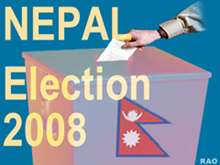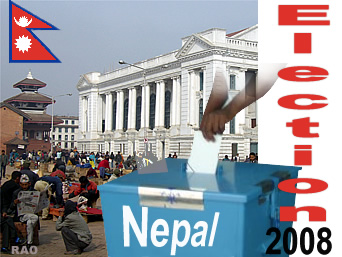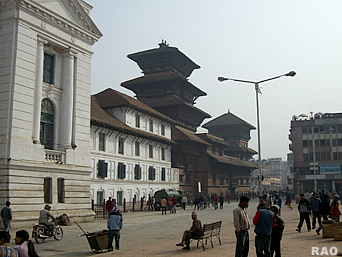 |
| Nepal 2008: Elections |
|
|
|
|
|
|
| ANFREL urges action to stem increasing pre-election violence |
| Violations of Code of Conduct must not go unpunished |
KATHMANDU, 24 March 2008, ANFREL
 |
|
Noting that the Election Commission enjoys great credibility for its neutrality and integrity, ANFREL encourages the Commission to capitalise on their reputation for fairness by dealing sternly with those that flout election laws.
"Violence and intimidation is restricting campaigning, frightening the public, and is preventing election officials, volunteers, and local observers from fulfilling their duties," said Ichal Supriadi, ANFREL's Mission Coordinator.
"To strengthen their commitment to a peaceful election, political party leaders must clearly condemn violence by their own cadres and take greater preventative action. At the same time, the Election Commission should send out a strong message by handing out strong punishments to those that ignore the code of conduct," he continued.
Regarding violence in the Terai, ANFREL encourages armed groups to respond positively to the invitation to talks recently issued by the government and urge them to refrain from implementing their programme to disrupt the election.
ANFREL's
report includes ten key recommendations to address pre-election violence,
and other challenges ahead of the election such as the need for greater
voter education.
| ANFREL First Pre-Election Report |
The Asian Network for Free Elections currently has 20 long-term international election observers deployed in each of the five development regions, but concentrated in the Terai. This report is a summary of their initial observations from 14th March 2008, as well as observations by ANFREL's core team based in Kathmandu. In total, observers visited 25 out of Nepal's 75 districts. This report focuses on pre-election violence and intimidation, as it was deemed the most serious threat to the election by ANFREL observers.
Intimidation and violence
Though the overall security situation in much of the country is conducive to the holding of a free and fair election, there continue to be certain districts which pose severe challenges to the election process, particularly in the eastern and central Terai (e.g. Saptari, Bara, Parsa, Dhanusha, Mahottari, and Sirah districts). Such difficulties have been highlighted most seriously by the killing of Kamal Prasad Adhikari, a candidate from the Rastriya Janamorcha party in Banke, and the death of the a CPN-M cadre in Arghakhanchi following an attack by UML members.
In half of the districts visited by ANFREL, violence or threats were being used to influence voter's choices. As well as overt violence, intimidation by party cadres, particularly by the CPN-Maoist and Young Communist League, is restricting the activities of political parties and preventing freedom of association and speech by voters. As intimidation is less visible than overt violence, it has proved inherently difficult to secure evidence that could lead to successful prosecution, leading to relative impunity.
While campaigning has intensified across the country, candidates in districts of the central Terai such as Mahottari have restricted their movement to urban areas only. Political parties have reported restrictions on campaigning in Maoist strongholds.
The impact of this insecurity is most of pronounced in more rural areas less accessible to government, security officials and election observers, where voters feel particularly insecure such as in Dang and Salyan districts. The work of local election observation groups has been impacted in some areas, where observers perceive or have received actual threats from armed groups, such as in Sirah, Bara, and Parsa districts.
Although the police have been perceived as competent in some areas, in more insecure and remote districts voters are not entirely confident that the police can provide a safe environment for campaigning and voting. While it is too early to fully assess how effective temporary police currently being recruited and trained will be, some stakeholders have expressed concerns over their political impartiality e.g. in Gandaki and Dhaulagiri.
The level of pre-election violence and intimidation has lead voters in some areas (e.g. Dhanusha, Bara, Parsa, and Mahottari districts) to expect that election day itself will be violent. Voters have cited the mobilization of large numbers of young party supporters around polling stations as a potential flashpoint. While political parties insist that these supporters are there to support the election process and provide for a more secure environment, ANFREL believes they risk generating inter-party violence and may restrict the freedom of movement of voters.
Despite these difficulties and such insecurities, most Nepalis have expressed a strong determination to exercise their right to vote, which they equate with a more peaceful Nepal. However, continued threats and violence are hindering electoral preparations and may yet lower turnout on election day.
The number of formal complaints made to the Election Commission about threats and violence most likely underestimates the scale of the problem. While political parties are more proactive in lodging complaints, there is a fear of reporting amongst the general public who suspect retribution by party cadres. The Election Commission, both centrally at a district level, enjoys strong respect from the public and most political parties for the neutrality and integrity; the EC stands to capitalise on their reputation for fairness by taking stronger action against those that violate the election law and code of conduct.
While expressing disappointment that Prime Minister G.P. Koirala had ruled out talks with armed groups in the Terai prior to the election, large Madhesi political parties maintained their willingness to encourage a dialogue, provided that the government extend an invitation to such groups. The recent invitation to talks made by Minister for Peace and Reconstruction Ram Chandra Poudel is a welcome step towards the full implementation of the eight point agreement between the Government and the United Democratic Madhesi Front of 28th February 2008.
Other areas
Voter illiteracy
- Despite the best efforts of the Election Commission, civil society, and the media, there remains significant confusion about the nature of the election, the most common problem being conflating the CA election with a Parliamentary election. The mixed electoral system also does not appear to be well understood. These problems sometimes apply in areas where the Voter Education Volunteers have already visited e.g. in Kancanpur, Tikapur and Masuria in Kailali district. In some districts, such as Saptari, the threat of violence has significantly hampered voter education efforts.
Potential misuse of state resources
- ANFREL observers have received some initial reports about the misuse of government resources for campaigning, which will be further observed and verified in the forthcoming weeks
"Dummy" candidates
- The fielding of supposedly independent candidates who are in fact aligned to a particular party will need to be closely monitored, as the presence of large numbers of agents allied to a single political party increases the risk of "booth capture". While this practice was exposed in constituency 10 of Kathmandu, it remains unclear whether it exists elsewhere.
Migrant workers
- Although election day is a public holiday, migrant workers have expressed some concern about the difficulty in travelling back to their home districts to exercise their vote
Recommendations
Intimidation and violence
1. Political parties should clearly and unequivocally condemn violence practised by their own party cadres and take greater preventative action to prevent further incidents
2. The Election Commission should take full advantage of their strong reputation for neutrality and fairness to strongly punish those that violate the code of conduct and election regulations
3. Armed groups should respond positively to an invitation for talks made by Minister for Peace and Reconstruction Ram Chandra Poudel recently, and be encouraged to do so by Madhesi leaders and others who can exercise leverage over them
4. In the absence of high-level agreements between political parties, intensify efforts to mediate conflicts at a local level
5. Closely monitor the performance of temporary police, ensuring that any politically aligned recruits are swiftly dismissed
6. Ensure that more remote areas where voters feel particularly insecure are not neglected by election stakeholders
7. The media should adhere to the standards of political neutrality outlined in the Code of Conduct and strive to report incidents of violence accurately
Other areas
1. Intensify use of broadcast media, particularly radio, for explaining the nature of the Constituent Assembly elections and the electoral system
2. Ensure that sufficient logistical support is afforded to Voter Education Volunteers to reach more remote districts, and that their visits are well planned to maximise the number of people reached on each visit
3. Encourage employers to allow their employees sufficient time off work to travel home to vote
ANFREL has undertaken over 30 election observation missions across Asia in more than 15 countries over the past 10 years. By drawing upon the expertise of local NGOs in the region we are pioneering a process of democratization in Asia led by Asians themselves.
| Source: ANFREL, March 2008 |
 |
 |
| Elections in Nepal |
| Links |
| External link |
|
|
|
 |

